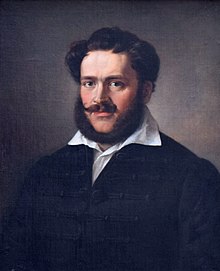Nikolaus Wesselényi
Nikolaus Freiherr Wesselényi von Hadad [ ˈvɛʃɛleːɲi ] (ung. Wesselényi Miklós , Slov. Mikuláš Vešeléni ) (born December 30, 1796 in Jibou (then Zsibó ), Transylvania , Kingdom of Hungary ); † April 21, 1850 in Budapest (then Pest ) was a baron , politician, landowner, member of the Hungarian Academy of Sciences and one of the leaders of the liberal Hungarian and Transylvanian opposition nobility from 1825 to 1840 in the Kingdom of Hungary .
Together with Ferenc Deák , Franz A. Pulsky and others, he was (especially at the beginning) a member of a group led by the Hungarian reformist István Széchenyi , which on the one hand wanted to implement liberal reforms in the backward Kingdom of Hungary (especially the peasants' liberation), but on the other hand wanted to bring about transformation of the state became a purely Magyar state (Magyarization). In contrast to the more radical group around Lajos Kossuth , however, they were in favor of a slow, non-violent assimilation of the non-Magyars in the kingdom.
When he was 15, Nikolaus was in command of a small division of the insurrection (the contingent) from 1809 and participated in the Austrian army in the last campaigns against Napoleon Bonaparte . The Kingdom of Hungary was part of the Austrian monarchy at the time. In the political arena, he first appeared at the county meetings in 1818 , where mainly the political situation was discussed. After a long break, he became active again in 1823. In 1823 his main work Szózat a magyar és szláv nemzetiség ügyében (Call on the matter of the Hungarian / Magyar and Slavic nationality) was published in Leipzig , in which he summarized his views on liberal reforms and on Magyarization and that on the most important works of Hungarian nationalism before 1848 counts.
In 1823 he met his friend István Széchenyi and made a study trip with him through Western Europe ( England and France ). In 1829 his second work, A régi híres ménesek egyike megszünésének okairól (About the causes of the end of one of the old stud farms) was published in Pest .
From 1830 to 1833 he appeared in the upper house of the regional parliament in Pressburg (now Bratislava ), where his fiery speeches of 1830 and 1832 earned him great authority and popularity. In 1833 his long banned Balitéletek (false judgments) appeared in Bucharest . His ideas gradually became more radical, he was the most ardent promoter of the lithographed newspaper published by Kossuth, and he called for Hungary to be separated from the Austrian monarchy. In 1834 he took part in the state parliament in Cluj / Klausenburg. In 1835 he was tried because of a speech he gave in the Sathmar County Assembly on the matter of the removal of the property and defended by the politician Kölcsey . In the summer of 1837 he and Kossuth were sentenced to three years in prison in Buda / Ofen. He began imprisonment in 1838 and later voluntarily spent it in Graefenberg , where he lost his sight . After he was pardoned in 1840, he retired to his castle in Zsibó. Afterwards he became an advocate for the assimilation of the non-Magyars of Hungary and spoke out in particular against the emancipation of the Slovaks .
As a result of the events of 1848 , after a long break, he returned to the state parliament in order to counter the rushes. But he could hardly achieve anything and then withdrew to Grafenberg. He caught a bad cold on the way home to Pest and then died in Pest.
Wesselényi also contributed to the spread of kindergartens and the introduction of silk farming in the Kingdom of Hungary as well as to some questions in the field of agriculture and animal breeding.
Honors
- Bronze relief by Barnabás Holló (1895), Franciscan Church , Budapest
literature
- Constantin von Wurzbach : Wesselényi, Nicolaus (son) baron . In: Biographisches Lexikon des Kaiserthums Oesterreich . 55th part. Kaiserlich-Königliche Hof- und Staatsdruckerei, Vienna 1887, pp. 154–160 ( digitized version ).
- Andras Gergely: Wesselény von Hadad, Miklós Baron , in: Biographical Lexicon for the History of Southeast Europe . Vol. 4. Munich 1981, p. 462 f.
| personal data | |
|---|---|
| SURNAME | Wesselényi, Nicholas |
| ALTERNATIVE NAMES | Wesselényi, Miklós; Vešeléni, Mikuláš |
| BRIEF DESCRIPTION | Hungarian politician, landowner, member of the Hungarian Academy of Sciences |
| DATE OF BIRTH | December 30, 1796 |
| PLACE OF BIRTH | Jibou (then Zsibó), Transylvania , Kingdom of Hungary |
| DATE OF DEATH | April 21, 1850 |
| Place of death | Budapest |
